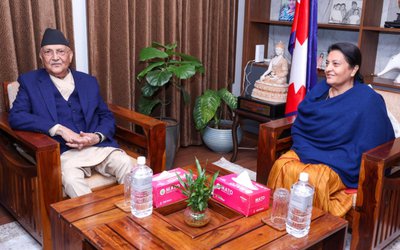Mountain countries have been facing a very difficult situation due to climate change. With more fluctuations in the weather patterns, mountain countries have to face more difficulties. From Glacier Lake Outburst (GLOF) to landslides and floods, the mountainous countries have been facing different kinds of problems. In the absence of collective efforts, voices of mountainous countries are yet to be heard at the global level, including at the level of United Nations Framework for Climate Change Conference (UNFCCC).
Nepal is organizing a ministerial level meeting of mountain countries. The Mountain Initiative was started in 2009 in Copenhagen by Nepal during the UNFCCC. During the COP 15, there were participants from different parts of the world. The participants, included US president Barack Obama and other heads of the states and governments. In a broad gathering, Nepal’s then prime minister Madhav Kumar Nepal proposed a mountain initiative. After an intensive discussion and preparation, Nepal took a decision to formally announce the initiative. This initiative came because the mountain ecosystem is coming under increasing threat because of climate change. After COP 15, the mountain initiative gradually took a concrete shape. The initiative is necessary for several reasons. This had to be the national agenda of Nepal because 83 percent of its land is occupied by mountains and remaining 17 percent of the flat land of southern Nepal also depends on the mountain eco-system. The southern plain is also supporting the mountains. There is no need to look at the issue by separating them. Although there are a large number of mountain countries around the world, the mountain agenda is yet to be strongly raised in the United Nations Frame Work of Climate Change Conference. At a time when mountain was not made any agenda in UNFCCC, Nepal made efforts to unite the mountainous countries to make their common voice heard by all. From Peru of Central America to Andes countries, from Russia to Tazikistan and Africa, there are a number of mountain countries. As Nepal’s mountains are more vulnerable to climate change, Nepal needs to have a platform to raise its own agenda. Nepal required a platform. Studies have shown that Nepal will face a severe situation due to climate change. In this context, the mountain initiative is in the interest of Nepal. This is the right time to raise the issue.
Mountain agenda is important for us because it is related to the livelihood of Nepalese. If one looks at it at the micro-level, one can find any effect in the mountain eco-system will have impacts in the pattern of migration. For instance, why did people from Tehrathum migrated to Itahari and people of Dailekh migrated to Kohalpur? The reason is simple because people migrated from hills to plains as they faced difficulties in livelihood. Due to difficulty in livelihood in Dadeldhura, people migrated to Attaria. From road to drinking water and land, the life in plains is much easier than the hills. If Nepal wants to protect its mountain eco-system, it must share its learning experiences with other mountain countries around the world. A single country cannot make any difference. International cooperation is required to deal with the problems faced by mountain countries. International cooperation includes development funding and international support. Through the Mountain Initiative, Nepal can push its mountain agenda at UNFCCC. If we hold the ministerial conference, it will also get a priority as a global agenda in Rio 20. Nepal can also generate the funding required to protect the mountains. The most important thing about the initiative is to exchange lessons among the countries.
For the mountainous countries like Nepal, they will need a platform to raise their voices. The Mountain Initiative is an occasion for Nepal to highlight its own issues. Although I am not in a position to speak the official voice of Nepal government, what I understand is ICIMOD has been supporting this initiative through an institution named IDS. However, it is the Ministry of Environment of government of Nepal that takes a lead in this process. This initiative has already passed different phases. Nepal raised the agenda of Mountain Initiative in 2009 COP 15. Then, the issue was also taken to Bon with two side events. Then, the issue was taken to Cancun with a side event. Recently, Nepal has already organized a side event even in South Africa. Nepal has invited various mountainous countries as well as director general of ICIMOD. Peru, India, Bangladesh, Bhutan, and Tazikistan also took part in the meeting. Nepal has already championed the Mountain Initiative agenda at the global level. ICIMOD has the knowledge as its works in the mountain related issues and it has the expertise. So, this agenda is the agenda of the government of Nepal.
There are various alliances in the UNFCCC: Least Developed Countries Alliance, Developing Countries Alliance and Small Island Countries Alliance. Various groups of countries have their own agenda. For instance, Annex 1 countries and developing countries raise their own agenda in COP. Nepal is supporting this initiative because the mountainous countries have their common agenda and common experiences to share. This is a very important initiative, albeit in early stage. If Nepal is able to establish the voice of the mountainous countries, it will also enhance Nepal’s image and prestige. This will get the agenda in funding mechanism of all levels. Till now, our agenda has not got the international attention. One of my studies has shown that the construction of mid-hills highway has transformed Ghurmi of Sindhuli District as many families who migrated to Janakpur decades ago are returning to their villages. If there is an increase in opportunities in mountains, migration will stop. Nepal can shared its knowledge with other countries as well. It can generate international funding. This is just an event. I don’t know what shape will the mountain initiative take. Nepal needs to formulate the mountain compatible adaptation plan. This is a long term issue. This initiative will just develop the platform. Nepal has the Chure Conservation Program. Nepal government needs to take certain steps in linking the mountain agenda with the national spectrum. Nepal also needs to link the mountain agenda as a curriculum at the college level.
Dr.Devkota is a former vice chairman of National Planning Commission. As told to New Spotlight



